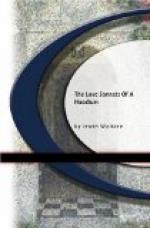Title: The Love Sonnets of a Hoodlum
Author: Wallace Irwin
Release Date: December, 2003 [EBook #4756] [Yes, we are more than one year ahead of schedule] [This file was first posted on March 12, 2002]
Edition: 10
Language: English
Character set encoding: ASCII
*** Start of the project gutenberg EBOOK, the love sonnets of A hoodlum ***
This etext was produced by David A. Schwan, davidsch@earthlink.net.
The Love Sonnets of a Hoodlum
by Wallace Irwin
With an Introduction by Gelett Burgess
Showing how Vanity is still on Deck,
& humble Virtue gets it in the Neck!
“A Leaden Heart I wear since she forsook me.”
The Love Sonnets of a Hoodlum
Introduction
“Tell me, ye muses, what hath former ages
Now left succeeding times to play upon,
And what remains unthought on by those sages
Where a new muse may try her pinion?”
So Complained Phineas Fletcher in his Purple Island as long ago as 1633. Three centuries have brought to the development of lyric passion no higher form than that of the sonnet cycle. The sonnet has been likened to an exquisite crystal goblet that holds one sublimely inspired thought so perfectly that not another drop can be added without overflow. Cast in the early Italian Renaissance by Dante, Petrarch and Camoens, it was chased and ornamented during the Elizabethan period by Shakespere, and filled with its most stimulating draughts of song and love during the Victorian era by Rossetti, Browning and Meredith. And now, in this first year of the new century, the historic cup is refilled and tossed off in a radiant toast to Erato by Wallace Irwin.
The attribute of modernity is not given to every new age. The cogs in the wheels of time slip back, at times. The classic revival may be permeated with enthusiasm, but it is a second edition of an old work — not a virile essay at expression of living thought. The later Renaissance was but half modern in its spirit; the classic period of the eighteenth century in England was half ancient in its mood. But the twentieth century breaks with a new promise of emancipation to English Literature, for a new influence has freshened the blood of conventional style that in the decadence of the End of the Century had grown dilute. This adjuvant strain is found in the enthusiasm of Slang. Slowly its rhetorical power has won foothold in the language. It has won many a verb and substantive, it has conquered idiom and diction, and now it is strong enough to assault the very syntax of our Anglo-Saxon tongue.[*]




